First Empires is a territory building, area movement game. Players will attempt to expand their civilization into new territories, invade the territories of opponents, and develop their civilization throughout the game to unlock abilities to help them win.

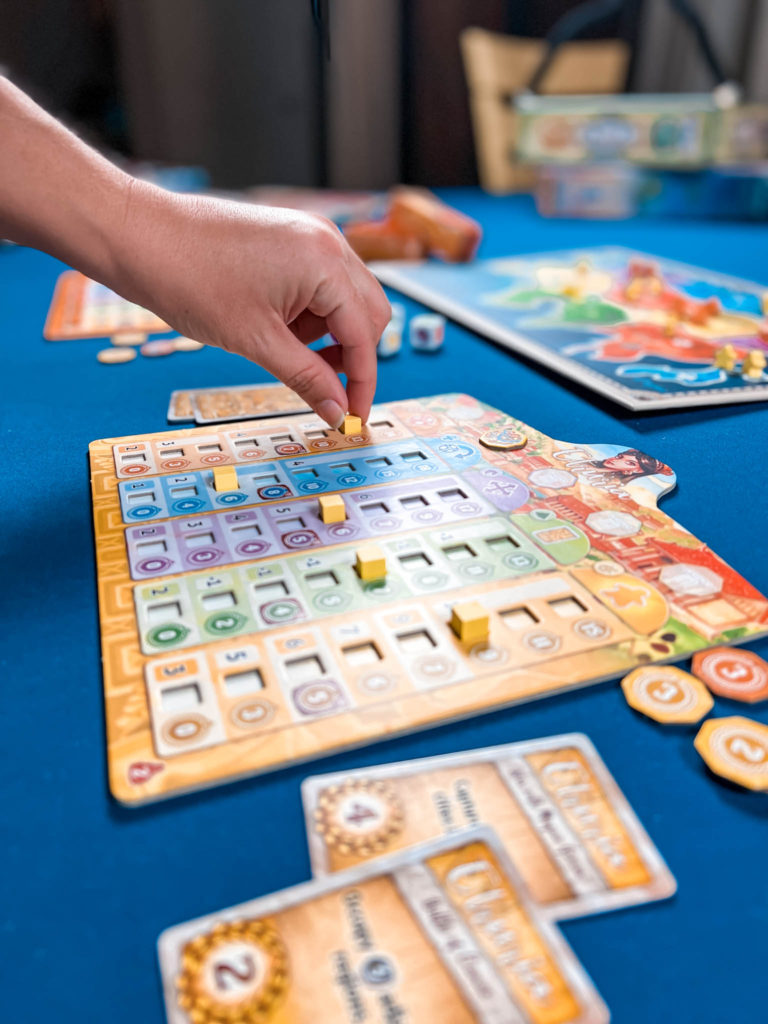
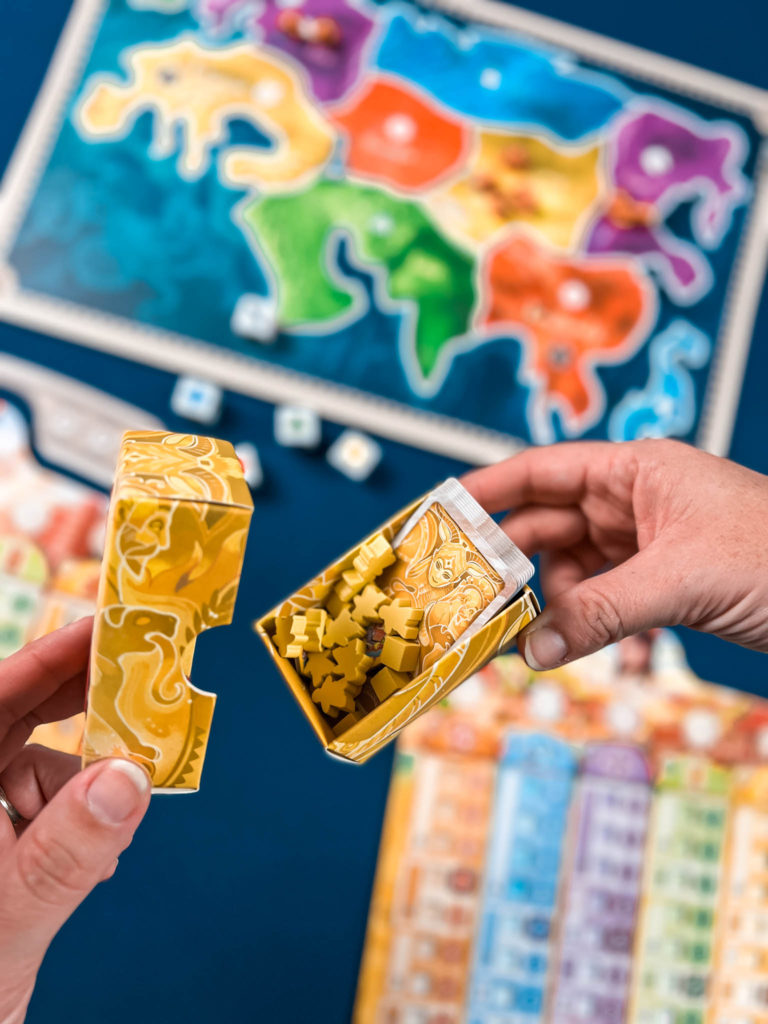
If you’re not already, be sure to follow us on Instagram for more board game reviews, tips, and recommendations!
How Do You Play First Empires?
First Empires plays over a set number of rounds dependent upon the number of players.
A typical turn involves a player doing the following:
Rolling a number of civilization dice.
Moving their explorers on the map to different regions.
Advancing on a track, if applicable, on their player board.
Players are able to advance on the tracks on their player board if they end their movement with explorers in regions of the map that correspond to the colors on the civilization dice they rolled.
Advancing on the various colored tracks earns players more points and gives their civilization enhanced abilities such as the number of dice they can roll, how much movement they can take, or number of explorers they can have on the map.
Players are able to invade and control territories by moving their explorers into different regions. If you enter a region with more people than your opponent, then you conquer that region and send them fleeing to a different region they currently occupy.
The game ends after the final round is completed.
Players earn victory points for their advancement track location, tokens they captured from their opponents during play, and completed achievement cards.
The player with the most victory points is the winner.


What Do We Think of First Empires?
First Empires is a great alternative to civilization games like Risk when you are looking for something that is a breeze to teach, great for younger players, but still packs the fun element of tension into the experience.
I love that First Empires is not just about invading and conquering different regions on the map, but it’s also about strategically upgrading different areas on your board so that you are successful later on. These tracks provide some really beneficial elements to help make your game successful — having more dice to roll and more explorers to place can be crucial when trying to take hold of different regions.
A cool thing that happens with your track advancement is the city placement. When you advance past a specific point on each advancement track, you must place a city token onto the board. These city tokens provide points, 1 to 3, to the player that controls that city token at the end of the game. However, during the game these city tokens can be lost or won. When someone conquers a region with a city token, they take that token and earn those points rather than the player who placed the city on the board.
These city tokens provide an extra layer of strategy to mull over. If you place all your cities quickly, you’ll have a difficult time defending them all. However, if you time when you place them throughout the game, you can make sure that you not only conquer some of your opponent’s cities, but retain many of your own as well.

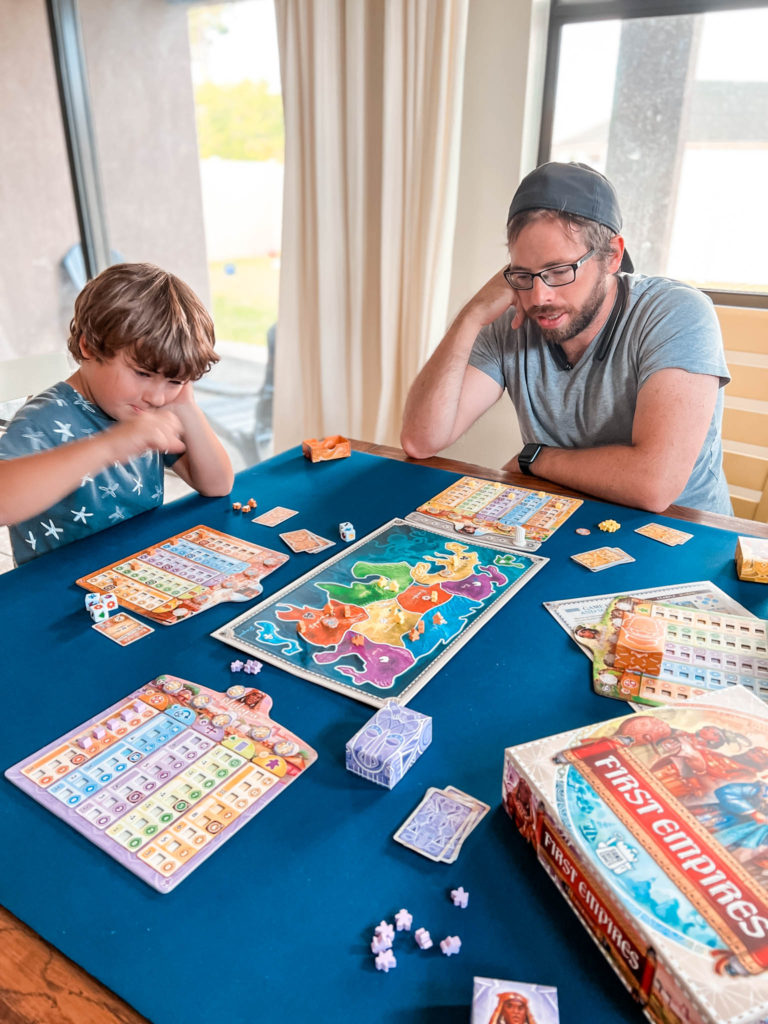

Conquering Regions
The conflict that happens is really straight forward which I love for families. If you can get more of your meeples into a region than your opponent has, then you conquer that region and force them to retreat. There’s no additional rolling of dice or fighting that happens. Simply invade with more people and win.
The retreating element is also great. While you lose one battle, you are able to choose where your meeples flee. This then helps you defend other regions from future attacks. Your meeples aren’t eliminated from the board putting you in a weaker position, they’re merely moved to a different region. This can sometimes even be a helpful event depending on where you are trying to move your meeple.
Moving our meeple around is something you are constantly incentivized to do. If you want to upgrade a specific color on your advancement board, then you need to occupy that same color region on the board. Players are constantly spreading out to try and get meeples in the colors they most need from round to round, making conflict likely and common. You won’t have a Risk situation where a player holes up in Australia for the entire game only to emerge in the final hour.



Great for Families
First Empires is a great choice for families. There is very minimal text for players to read so emerging readers aren’t at a disadvantage. The rules are also so straightforward and easily taught that players as young as six and seven can join in the game. (That said, I feel First Empires is best suited for a 9-10 year old and up for fuller grasp of strategies.)
Despite all of the conflict in the game, First Empires never once felt mean or spiteful. This game does not have the “take that” mechanic that can be a hard sell for family games. I think that this is in large part aided by not only the simplicity of conquering but by the helpful aspect of retreating when you lose a region. It’s like getting a free movement that can set you up perfectly for your next turn.
What’s even better, is the game has a built in rule that says if a player is down to their last region, then they cannot be conquered. This, combined with the fact that you don’t lose people or points when another player invades keeps the game very friendly.
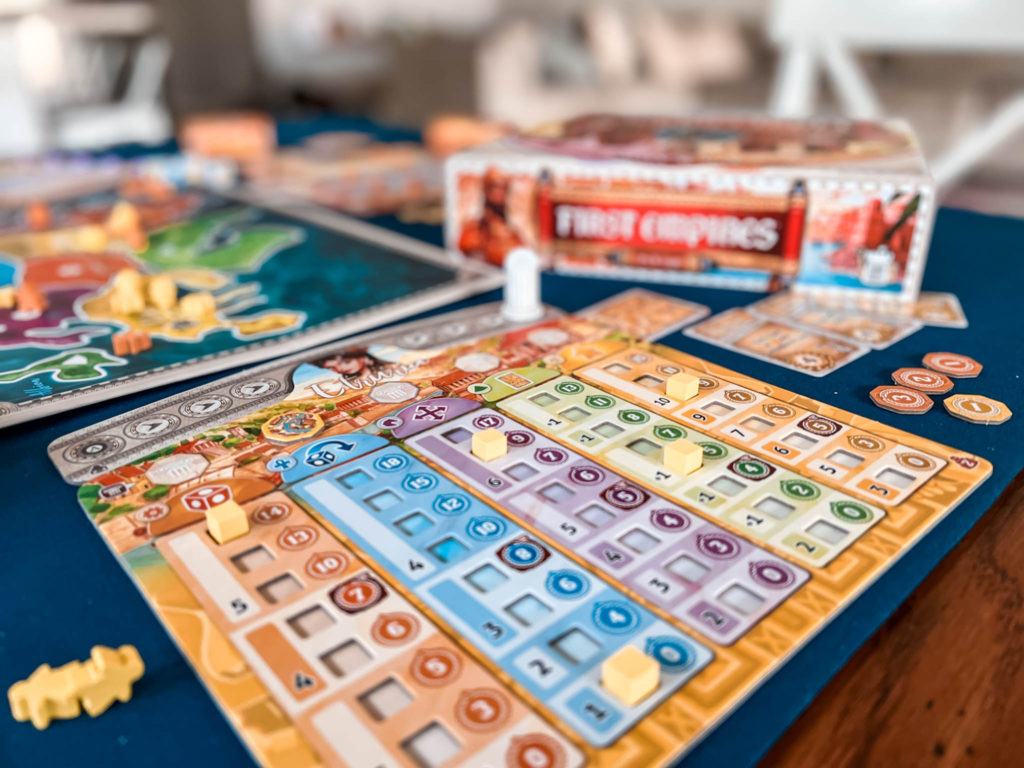


Summary
First Empires combines light combat play with straightforward rules to make for a great gaming experience. First Empires is quick to teach and doesn’t overstay its welcome as most games take less than an hour to complete.
While it will undoubtably be too light for some gamers, we see this as an excellent, family friendly combat game to challenge both young and new players without overwhelming them with a laundry list of rules.
The production is also superb, coming standard with recessed player boards, player packs for easy set ups, and really engaging art and colors that pop off the board. All in all, a really well made game and a great combination of the track advancement and combat mechanisms.
Bring home a copy of First Empires.
Find this and all our top game recommendations on our Amazon Storefront.
A special thank you to our friends at Asmodee for sending a copy of First Empires for review.
As always, our thoughts and opinions are our own.
Game Info:
Title: First Empires
2-5 Players Ages 14+
Designer: Eric B. Vogel
Artist: Jeremie Fleury
Publisher: Sand Castle Games
If You Liked This Post You May Also Like:
Funkoverse Board Games Review
Tiny Epic Tactics Review
Skulk Hollow Review
